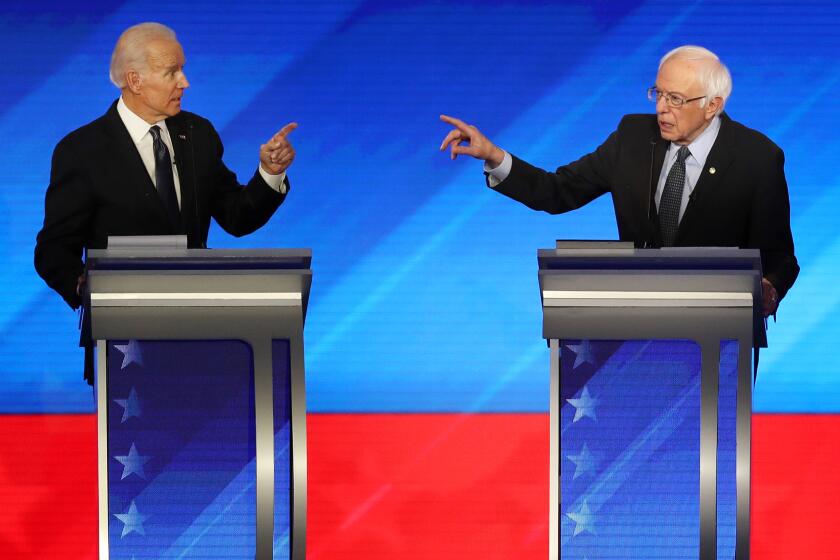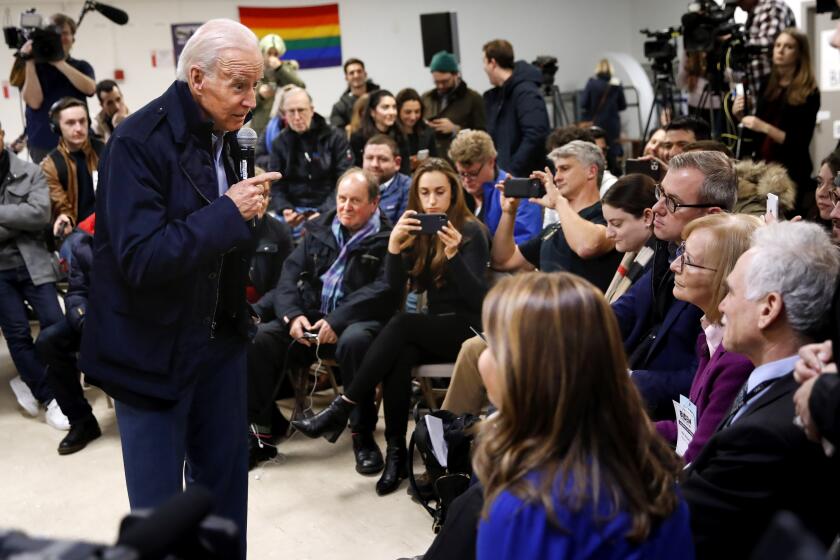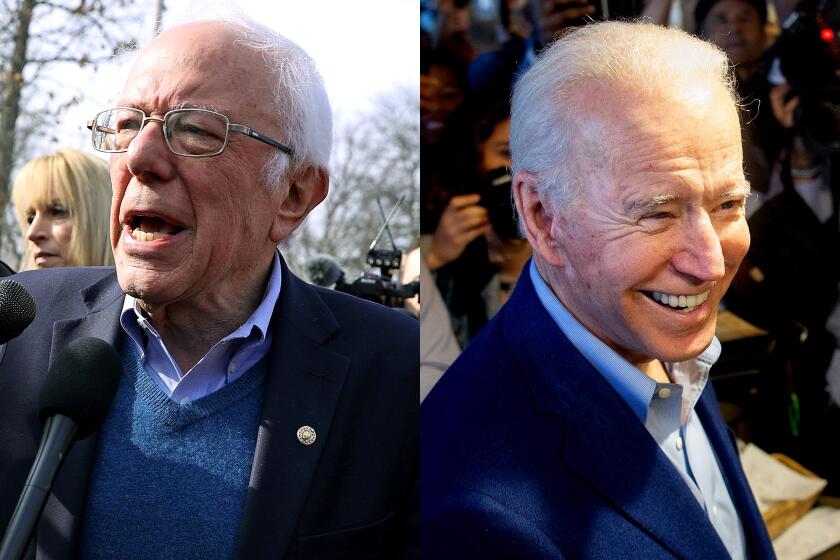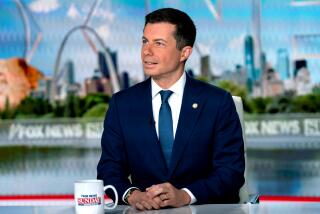Democratic presidential candidates attacking Pete Buttigieg as New Hampshire primary nears
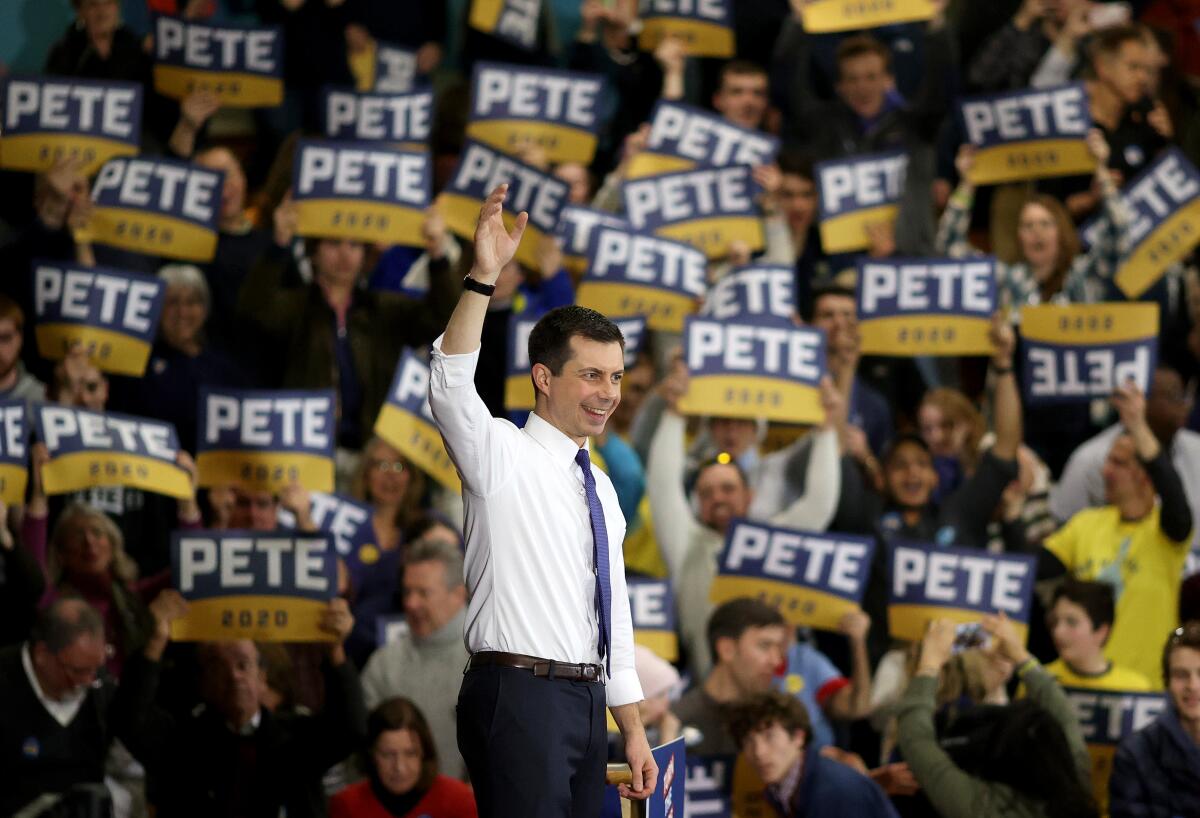
MANCHESTER, N.H. — Pete Buttigieg came under stepped-up attack from fellow Democrats eager Sunday to slow his momentum in the presidential race by highlighting his struggle to attract African American support, his lack of broad government experience and willingness to collect checks from well-heeled campaign donors.
The 38-year-old former mayor of South Bend, Ind., riding a surge of interest after his performance in last week’s Iowa caucuses, responded by hitting back.
He surfaced on all five of Washington’s Sunday morning talk shows, where he asserted that efforts to stop his sudden political rise reflect the very sort of Beltway insularity and arrogance that put off many voters.
“We know that we might look small from the perspective of Washington,” he said on CNN, referring to his stewardship of a city of roughly 100,000 residents. “But for us it is what is going on in Washington that is small and small-minded.”
Three days before New Hampshire votes in the nation’s first presidential primary, the state was blanketed with a mantle of snow and buried in a blizzard of politicking: candidates stumping, their supporters door-knocking, the television airwaves saturated with advertising.
While Buttigieg fended off criticism, chiefly from former Vice President Joe Biden and Vermont Sen. Bernie Sanders, Massachusetts Sen. Elizabeth Warren called for rivals to focus their efforts on beating President Trump, and Minnesota Sen. Amy Klobuchar boasted of crossover appeal that could broaden support for the Democratic ticket in November.
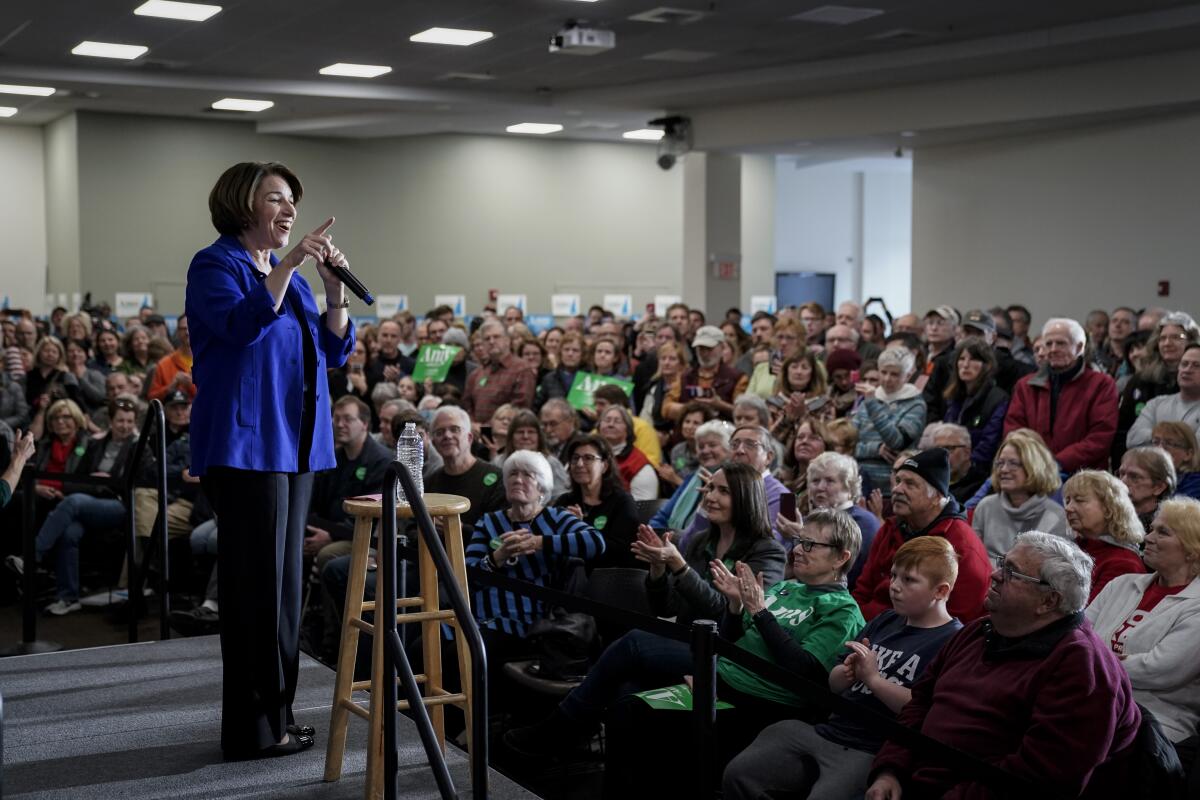
“I’m someone that can bring people with me, that doesn’t shut them out,” Klobuchar, a three-term senator and former Hennepin County attorney, told a crowd of several hundred at Southern New Hampshire University in Manchester. “I’ve won every place, every race, every time.”
Buttigieg, who was a national political unknown a year ago, was the focus of not just his political opponents but curiosity-seekers who flooded his appearances, producing some of the largest crowds in the state this election season.
Rival candidates tried to slow the momentum of Pete Buttigieg and Bernie Sanders on the debate stage Friday night, as election day in New Hampshire approaches with the two leading the pack.
Rebecca Powell, who described herself an “Elizabeth Warren supporter with an open mind,” showed up in Nashua, near the Massachusetts border, intrigued after Buttigieg finished effectively tied with Sanders in Iowa.
“Honestly, the momentum and the way that he talks and his cadence and attitude really reminds me a lot of [President] Obama,” said Powell, 28, who works at a psychiatric hospital in Nashua. “You have to have someone who can handle the scrapping but still kind of rise above it.”
Buttigieg didn’t just respond to attacks. In Dover, in coastal New Hampshire, he launched one of his own, suggesting that Sanders was too divisive to win in November.
“I respect Senator Sanders, but when I hear this message go out that you’re either for a revolution or you’ve got to be status quo, that’s a vision for this country that doesn’t have room for most of us,” Buttigieg said.
New Hampshire has a history of political volatility — Obama was leading Hillary Clinton by 10 percentage points in some 2008 polls just before she beat him in the primary — so any opinion surveys must be viewed skeptically.
Still, it was evident that Buttigieg has been the candidate with momentum in the last week, and others scrambled to keep him from notching a victory Tuesday that could launch him into Nevada, which votes Feb. 22, and the rapid succession of contests that follow.
Few candidates stand to lose as much from a poor showing as Biden, whose fourth-place Iowa finish banished any sense he was the most electable candidate in the field, or that the nominating fight would be settled anytime soon.
Facing dire political straits, the former vice president steps out and holds forth before reporters in Manchester, N.H.
He stepped up efforts to reignite his candidacy Sunday with an ABC interview in which he repeatedly and pointedly critiqued Buttigieg.
“No one has ever won the nomination without being able to get overwhelming support from the African American community,” said Biden, whose political base rests on the support of black voters. “And, so far, no one’s been doing that but me.”
Biden also took aim at Sanders, warning that his identification as a democratic socialist could hurt down-ballot Democrats. “You’re going to win with that label?” he scoffed.
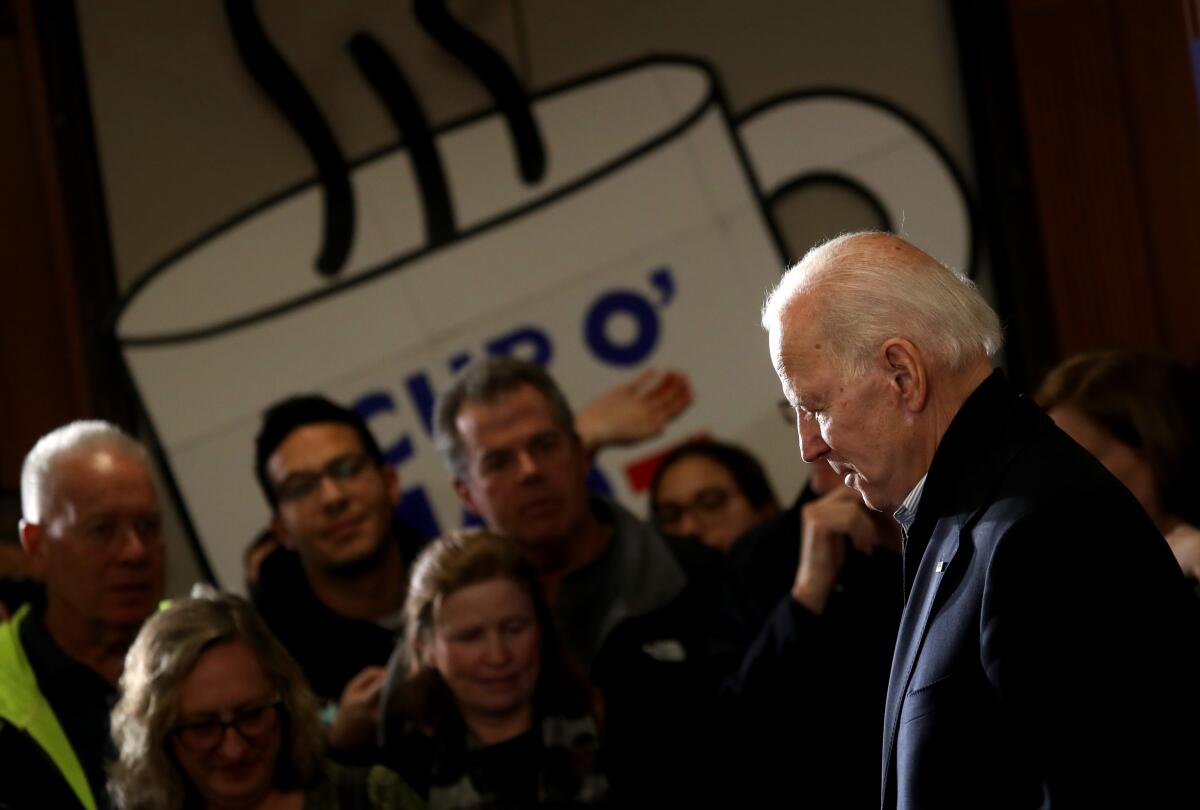
Biden took a less confrontational approach at a freewheeling town hall in Hampton, in eastern New Hampshire, where he commended Buttigieg and Sanders on their Iowa showing. (Sanders won the most votes, but the winner there has historically been judged by the competition for national delegates, where Buttigieg led 14-12, state party officials said Sunday. Warren followed with eight, Biden had six, and Klobuchar one.)
“They did a great job,” Biden said of Buttigieg and Sanders. “They were really well-organized, better organized than we were.”
Sanders, campaigning just off the Dartmouth College campus in Hanover, used an appearance before several hundred supporters to assail Buttigieg for his support among affluent donors.
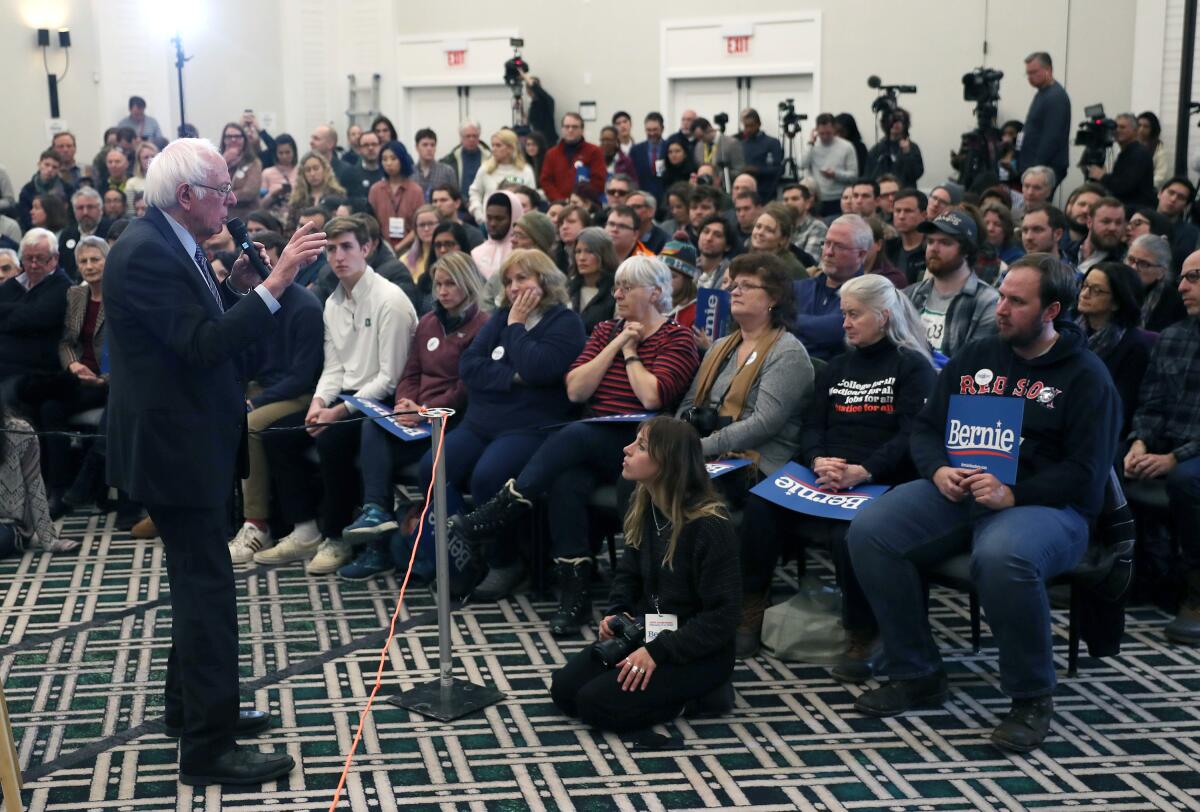
“I’m running against some guys — Pete Buttigieg, among others — who have raised campaign funds from over 40 billionaires, 40 billionaires, heads of large corporations,” said Sanders, who has made his strong support among small-dollar givers a fundamental part of his candidacy.
While some of those running — Biden and Buttiegieg, among them — have warned of too-drastic change, supporters of Sanders said his calls for political revolution were precisely what appealed to them.
“I feel like he’s the most radical candidate,” said Olivia Lovelace of Houston, a Dartmouth junior, “and I’m looking for the most radical candidate.”
Warren, speaking to hundreds of supporters at a middle school in Concord, the state capital, made a similar pitch for “big structural change,” starting with efforts to take on the corruption she called endemic to Washington and the political process.
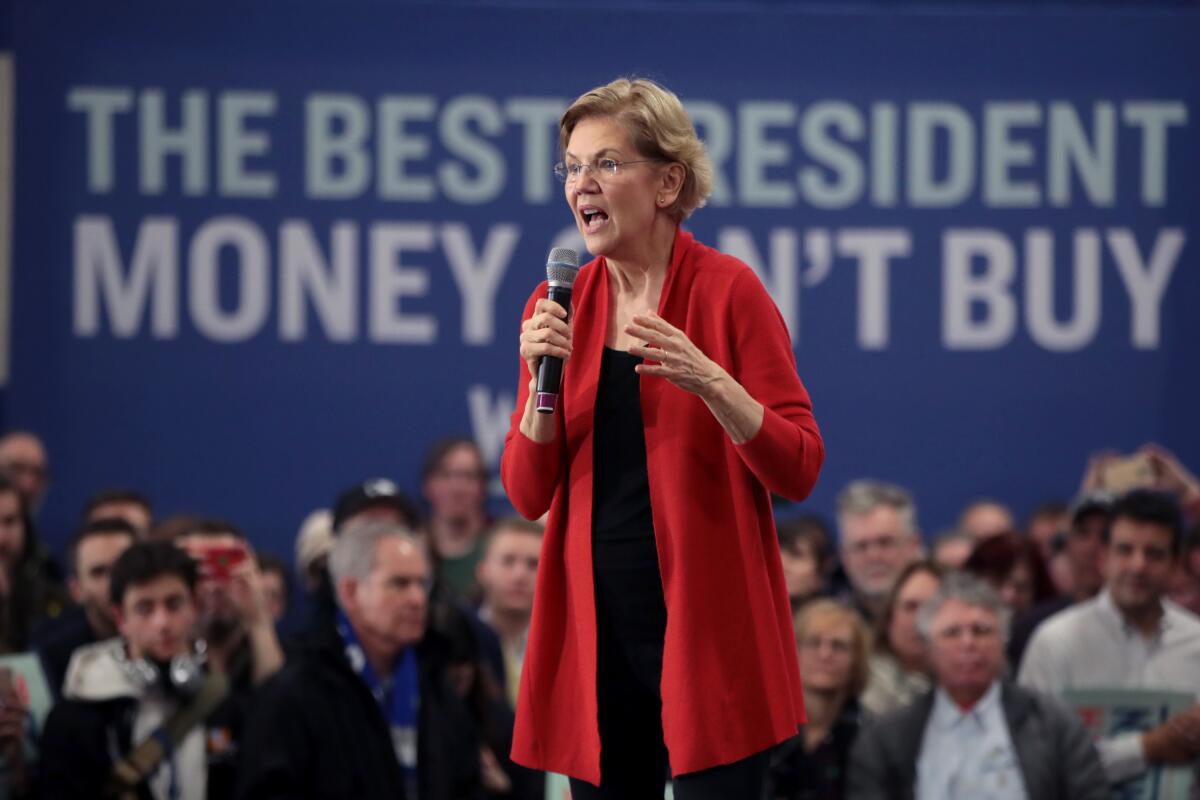
By overhauling the political system and the influence of moneyed interests, Warren said, “We can build a very different America. We can build an America of opportunity for every single human being in this country.”
Warren made no overt mention of her rivals when she spoke, though she did take a veiled swipe at Tom Steyer, the hedge-fund billionaire, and former New York City Mayor Michael Bloomberg, who is sinking a part of his vast fortune into the campaign.
Billionaire Michael Bloomberg’s advertising for California’s March 3 election is unprecedented for a Democratic presidential primary.
Touting her plan to raise taxes 2 cents on the dollar of assets over $50 million, Warren said — with some exaggeration — billionaires had taken to weeping over the proposal. “Some cry. Some ran for president,” she said, to a knowing laugh from the crowed. “Figured it was cheaper than paying 2 cents.”
Warren told reporters afterward said she was shunning direct attacks on other candidates and sticking to her own positive message because the most important thing was to unify Democrats to take on Trump.
“We’re going to have to bring our party together,” she said. “And the way we do this is not by launching a bunch of attacks on each other and trying to tear each other down. The way we do this is that we talk about the things that we can run on together.”
Times staff writers Mark Z. Barabak and David Lauter and special correspondent Caroline S. Engelmayer contributed to this report from New Hampshire.
Here are key dates and events on the the 2020 presidential election calendar, including dates of debates, caucuses, primaries and conventions.
More to Read
Get the L.A. Times Politics newsletter
Deeply reported insights into legislation, politics and policy from Sacramento, Washington and beyond. In your inbox three times per week.
You may occasionally receive promotional content from the Los Angeles Times.
